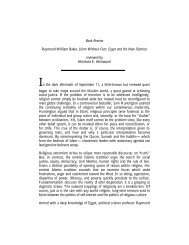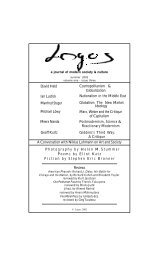Michael J. Thompson Stephen Eric Bronner Wadood Hamad - Logos
Michael J. Thompson Stephen Eric Bronner Wadood Hamad - Logos
Michael J. Thompson Stephen Eric Bronner Wadood Hamad - Logos
You also want an ePaper? Increase the reach of your titles
YUMPU automatically turns print PDFs into web optimized ePapers that Google loves.
Stanley Aronowitz<br />
A self-declared independent leftist (which, in the Cold War era meant an anti-<br />
Stalinist, but unaligned radical), Mills had been influenced by Trotskyism early<br />
in his life. He carefully separated the still influential Communists from<br />
radicalism. The Communists were influential precisely because the party had<br />
been an important vehicle for organizing major industrial unions and for<br />
bringing militant workers into the New Deal. During the war, they played a<br />
major role in enforcing the wartime no-strike pledge and the government’s<br />
drive for productivity. Mills believed that whatever oppositional politics they<br />
evinced after the war was due, almost exclusively, to the chasm between the<br />
United States and the Soviet Union.<br />
Listen Yankee (1961) an exemplary instance of Mills’s penchant for rowing<br />
upstream, was, during its early years, a fierce defense of the Cuban revolution<br />
when, even for many anti-Stalinist radicals, it appeared that the regime was<br />
dedicated to raising living standards and was still open to a democratic society.<br />
At a time when even the liberal icon, Oregon Senator Wayne Morse, was a<br />
vocal advocate of counterrevolution and supported the Kennedy<br />
administration’s ill-fated Bay of Pigs invasion, Mills asserted the right of the<br />
Cuban people to determine their own destiny and sharply condemned U.S.<br />
policy in the Caribbean and Latin America. He excoriated liberals and<br />
conservatives alike for their support of anti-popular regimes such as that of<br />
Batista in Cuba and Somoza’s brutal Nicaraguan dictatorship, pointing out<br />
how the U.S. government had opposed democratic efforts by financing<br />
military counterinsurgency, especially against the Arbenz regime in Guatemala<br />
as well as Cuba’s new revolutionary government. While he had been a lifelong<br />
anti-Communist, Mills saw the Cuban revolution as a harbinger of the long<br />
struggle of peasants and workers for liberation from colonialism and<br />
imperialism and predicted serious future confrontations between the spreading<br />
insurgencies and the United States which, under Democratic and Republican<br />
national administrations alike, became the main defender of the dictators.<br />
Indeed, for the length of the 1960s and beyond, Mills’s provocative<br />
intervention seemed prescient. In Colombia, Douglas Bravo led a formidable<br />
armed uprising and Che Guevara led a band of guerillas into the Bolivian<br />
jungle which, like the Colombian revolt, failed. But, with Cuba’s material<br />
help the Sandanistas in Nicaragua and the National Liberation Front in El<br />
Salvador were alive with revolutionary activity and, by the mid-1960s the<br />
<strong>Logos</strong> 2.3 – Summer 2003




